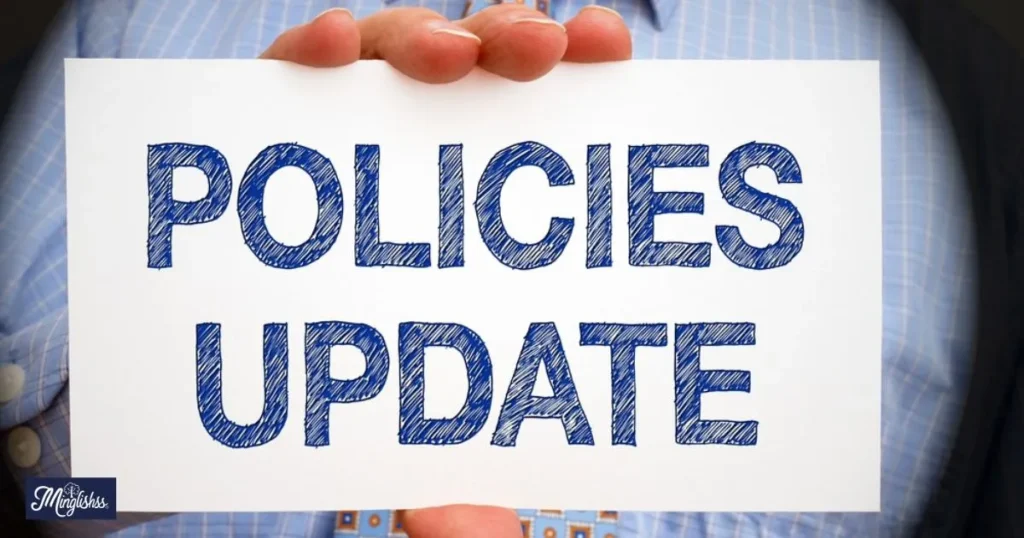“Learn creative alternatives for saying ‘grandfathered in’ in everyday language!”
The phrase “grandfathered in” is commonly used to describe situations where people or organizations are exempt from new rules or conditions due to prior inclusion. While this term is convenient, it can also feel outdated or even exclusionary. Modernizing language is key to effective communication, especially in professional, legal, or social contexts.
Looking for fresh ways to say it? By understanding different alternatives to “grandfathered in,” you can elevate your language while maintaining clarity and inclusivity. Whether you’re drafting a legal document, addressing workplace policies, or simply trying to avoid jargon, knowing the right phrase for the situation is essential.
In this post, we’ll explore 35 alternative phrases for “grandfathered in”, providing scenarios, explanations, and tips to help you apply them. You’ll discover phrases that can be used in various contexts, ensuring your communication is precise, professional, and up-to-date.
1. Exempt from New Rules
Scenario: A company introduces new policies regarding work-from-home allowances, but employees who were already working remotely before the policy change are not impacted.
Explanation: This phrase clearly communicates that certain individuals are not subject to the new rules or regulations. It’s an effective way to specify that someone is excluded from changes based on their prior status or involvement.
Additional Tips:Use this in legal documents, corporate memos, or HR communications for transparency and clarity.
2. Legacy Status

Scenario: A company rolls out new employee benefit packages, but retirees and long-serving employees continue to enjoy the previous benefits package they were entitled to.
Explanation: “Legacy status” suggests that someone or something is part of an older, established system. It carries a tone of respect and recognition for past contributions, making it particularly suitable for professional settings where tenure or prestige is important.
Additional Tips: Ideal for use in industries like finance or education, where maintaining historical ties or seniority can be valued.
3. Previously Accepted Terms
Scenario: A company updates its service contract for new clients, but those who signed earlier agreements continue to operate under the original conditions.
Explanation: This phrase is straightforward and highlights that the individual or group remains bound by the initial terms of an agreement. It emphasizes continuity in terms of rights and responsibilities from an earlier arrangement.
Additional Tips: Use this phrase when discussing contract renewals, legal obligations, or policy updates. It maintains professionalism and ensures there is no confusion about ongoing terms.
4. Grandfather Clause Applied
Scenario: A local government passes a new zoning law, but existing businesses in the affected area are not required to comply because they were established before the law was enacted.
Explanation: This term is commonly used in legal and regulatory contexts. It indicates that a clause has been inserted into new rules to protect individuals or entities that existed before the changes were introduced.
AdditionalTip: Best used in legal, governmental, or compliance scenarios where specific provisions need to be mentioned clearly and explicitly.
5. Retained Rights
Scenario: A landlord revises the terms of their rental agreement, but long-term tenants are allowed to keep the privileges they were initially given, such as parking spots or storage.
Explanation: This alternative makes it clear that someone is allowed to keep certain rights or privileges, even though the rules have changed for others. It emphasizes continuity and preservation of prior benefits.
Additional Tip: Suitable for legal contracts, property management, or any situation where someone’s rights need to be clearly stated and preserved.
6. Existing Arrangement Maintained
Scenario: A new policy on software usage is introduced at a tech firm, but current employees who have been using certain tools are allowed to keep their existing setup.
Explanation: This phrase communicates that individuals are allowed to continue operating under an older system or rule while new entrants must follow updated protocols. It’s simple yet effective, ensuring clarity in the communication.
Additional Tip: Use this phrase when transitioning between old and new procedures or policies to clearly separate those who are affected from those who aren’t.
7. Previously Granted Exemptions
Scenario: A university revises its scholarship criteria, but students who received scholarships under the previous guidelines remain eligible for the benefits.
Explanation: This phrase highlights that specific individuals or groups are excused from new requirements because they were granted exemptions before the changes took place. It ensures a clear distinction between past and future recipients.
Additional Tip: Ideal for academic, financial aid, or legal communications, where it’s important to emphasize who remains unaffected by updates to policies or criteria.
8. Protected by Prior Agreement
Scenario: A software company changes its licensing fees for new customers, but existing users continue to pay the original rates.
Explanation: This alternative communicates that individuals or organizations are shielded from new conditions due to an earlier arrangement. It reinforces the notion of protection under an agreement that predates the changes.
Additional Tip: Use this when discussing contracts, subscription models, or any setting where individuals are protected under
9. Existing Rights Preserved
Scenario: A city enforces stricter building codes for new homeowners, but those who have lived in the area for decades are allowed to keep their homes as they are.
Explanation: This phrase underscores that someone’s rights or privileges are being kept intact despite new regulations. It highlights continuity and protection of previously established rights.
Additional Tip: Effective in legal, housing, or urban development settings where property rights or long-standing privileges need to be maintained clearly.
10. Excluded from Changes
Scenario: A company adjusts its employee vacation policy, but those who have been with the company for over ten years are not subject to the new rules.
Explanation: This phrase plainly states that certain individuals or groups are not affected by recent changes, making it a simple and clear alternative to “grandfathered in.” It’s useful in situations where clarity is key.
Additional Tip: Use this in company communications or HR policies when informing employees or clients about policy changes and who is or isn’t affected by them.
11. Prior Conditions Honored
Scenario: A gym changes its membership pricing, but long-term members continue to enjoy their original rates.
Explanation: This phrase conveys that earlier agreements or terms are still being respected, despite new rules coming into effect. It highlights the company’s commitment to maintaining prior arrangements.
Additional Tip: Useful in customer relations or service agreements where loyalty and long-term commitments are valued.
12. Exempt Under Previous Guidelines
Scenario: A government imposes stricter environmental regulations on factories, but those built before the law are allowed to continue operating under older rules.
Explanation: This alternative indicates that certain entities are excused from new regulations because they were compliant under the previous set of rules. It is a formal and clear way to explain regulatory exemptions.
Additional Tip: Appropriate for legal or regulatory discussions where a clear distinction between old and new rules needs to be made.
13. Retained Under Former Policy
Scenario: A school district updates its grading system, but students who started their schooling under the older system continue to be graded by those standards.
Explanation: This phrase communicates that someone remains governed by a previous policy, even as new guidelines are introduced. It reinforces a sense of fairness and consistency for those affected.
Additional Tip: Ideal for educational or institutional settings where rules and policies often change but need to be applied gradually.
14. Grandfather Provision in Place

Scenario: A utility company increases rates for new customers, but those who have been clients for over a decade continue to pay the original rates.
Explanation: This formal term is often used in legal or corporate settings to describe the specific allowance that lets individuals avoid new rules. It implies a legal or contractual element to the exemption.
Additional Tip: Best used in legal documents or formal policies where the term “provision” can add a level of professionalism and authority.
15. Protected by Prior Contract
Scenario: A landlord raises the rent for new tenants, but those who have been renting for years are protected under the terms of their original lease.
Explanation: This phrase emphasizes the security provided by an earlier agreement, assuring that changes in policy will not affect those under an existing contract. It is ideal for conveying contractual protection.
Additional Tip: Commonly used in real estate, legal, and business contexts where contracts govern ongoing relationships.
16. Pre-existing Terms Apply
Scenario: A tech company updates its subscription terms, but users who signed up before the change continue with the same conditions.
Explanation: This alternative clearly states that individuals are still governed by the original terms of an agreement. It’s a simple way to communicate that no changes will be made to the current arrangement.
Additional Tip: Suitable for customer service, subscription-based models, or any situation where old and new terms might conflict.
17. Not Subject to New Requirements
Scenario: A professional organization introduces new certification requirements, but members who joined before the change do not need to meet the updated criteria.
Explanation: This phrase explains that certain individuals or entities are exempt from new rules or conditions. It’s a straightforward and professional way to communicate exemptions.
Additional Tip: Use this in professional, academic, or regulatory settings where it’s crucial to distinguish between different levels of compliance.
18. Exempt Under Original Agreement
Scenario: A health insurance provider changes its coverage plan, but long-standing policyholders continue with the original benefits they signed up for.
Explanation: This phrase highlights that individuals or groups remain exempt due to the terms of an earlier agreement. It ensures clarity regarding ongoing benefits and coverage.
Additional Tip: Perfect for contractual and legal communications, particularly in insurance or service industries.
19. Existing Benefits Preserved
Scenario: A company revises its employee retirement plan for new hires, but those who have been with the company for a long time retain the previous benefits.
Explanation: This phrase emphasizes that someone’s benefits or privileges remain unchanged despite modifications for others. It conveys fairness and respect for long-term commitments.
Additional Tip: Use this when communicating benefits or perks in HR, legal, or business settings.
20. Excluded from Updated Policies
Scenario: A college updates its residency requirements for new students, but current students are allowed to follow the older guidelines.
Explanation: This phrase indicates that individuals or groups are not affected by new policy updates. It is a simple and effective way to explain exemptions or exclusions.
Additional Tip: Best used in academic or professional settings where policies frequently change but need to be applied gradually.
Other Ways to Say “I Hope This Doesn’t Cause Any Inconvenience”
21. Grandfathered Privileges
Scenario: A golf club changes its membership rules, but long-time members retain access to the club’s original benefits and amenities.
Explanation: This term is a direct reference to privileges granted under old rules, implying that long standing members or users continue to enjoy certain rights. It’s a respectful way to refer to those who benefit from prior conditions.
Additional Tip: Useful in membership-based organizations, such as clubs, where older members are often allowed to keep their privileges even as rules change for new members.
22. Pre-existing Agreement Applies
Scenario: A telecommunications company changes its data plan, but customers who signed up before the change continue to benefit from the original terms.
Explanation: This phrase emphasizes that individuals or groups continue to operate under the terms of a previous agreement. It’s clear and formal, making it ideal for explaining that a prior deal is still valid.
Additional Tip: Commonly used in business and legal settings where the details of agreements need to be transparent and precise.
23. Protected by Prior Conditions
Scenario: A company introduces stricter health and safety regulations for its new employees, but current workers are still governed by the earlier standards.
Explanation: This phrase makes it clear that an individual’s rights or privileges are safeguarded by previous conditions or rules. It emphasizes continuity and protection from new regulations.
Additional Tip: Effective in compliance and legal documentation where safeguarding rights under older policies is crucial.
24. Earlier Rights Upheld
Scenario: A university introduces new tuition fees, but students who enrolled under the old pricing continue to pay the original amount.
Explanation: This alternative clearly communicates that someone’s original rights or privileges remain intact, despite new regulations or policies being introduced. It conveys fairness and respect for pre-existing conditions.
Additional Tip: Best used in educational, financial, or legal settings where rights need to be upheld as policies change.
25. Retained Under Previous Policy
Scenario: A company changes its vacation accrual policy for new hires, but existing employees retain their vacation days under the old policy.
Explanation: This phrase signals that certain individuals or groups will continue to operate under the older version of a policy. It is a clear, concise way to differentiate between new and old rules.
Additional Tip: Great for HR communications and legal documents that outline different policy versions for different groups.
26. Excluded from Policy Update

Scenario: A retail chain updates its return policy for customers, but those who purchased items before the change are allowed to follow the old policy.
Explanation: This alternative simply states that certain people or groups are not affected by changes to policies. It’s an easy-to-understand phrase that works well in customer service settings.
Additional Tip: Ideal for retail, service, or customer relations where transparency about policy updates is necessary.
27. Maintained Status under Old Agreement
Scenario: A company revises its retirement benefits for future employees, but those already employed continue to follow the old benefits package.
Explanation: This phrase indicates that someone’s status remains the same despite new rules being introduced. It’s useful when differentiating between groups affected by new policies and those who aren’t.
Additional Tip: Suitable for HR or legal settings where benefits and employment agreements are being updated.
28. Granted Exception Due to Tenure
Scenario: A university changes its faculty promotion criteria, but professors who have been teaching for decades are exempt from the new guidelines.
Explanation: This phrase highlights that someone has been given an exception based on their tenure or length of service. It’s ideal for situations where longevity or seniority plays a key role in exemptions.
Additional Tip: Effective in academic or professional settings where seniority is considered when implementing new rules or guidelines.
29. Retained Benefits from Previous Contract
Scenario: An insurance company revises its coverage plans, but policyholders who signed up before the changes retain the old benefits.
Explanation: This alternative specifies that benefits from an older contract continue to apply, even though the terms have changed for others. It clearly communicates that long-standing agreements are still honored.
Additional Tip: Best used in legal and insurance contexts where policies frequently change but older clients remain under previous agreements.
30. Excluded from New Terms
Scenario: A business updates its employee working hours, but those hired under the old contract are allowed to maintain their previous schedule.
Explanation: This phrase simply states that a group is not subject to newly established terms. It’s a direct way to explain exemptions and avoid confusion in policy communication.
Additional Tip: Useful in employment contracts or corporate communications when distinguishing between old and new agreements.
31. Original Rights Upheld
Scenario: A government introduces new taxation laws, but individuals who were already retired are not affected by the changes.
Explanation: This alternative emphasizes that someone’s original rights are still respected and upheld, despite new regulations being put in place. It assures continuity and fairness.
Additional Tip: Suitable for legal, governmental, or financial documents where rights and obligations need to be clearly distinguished between groups.
32. Grandfathered Arrangement Maintained
Scenario: A neighborhood association changes its guidelines for home renovations, but long-time residents are allowed to follow the older rules.
Explanation: This alternative retains the use of the term “grandfathered,” ensuring that the concept is still understood while communicating that prior arrangements are respected.
Additional Tip: Use this in neighborhood, HOA, or legal settings where older residents or members are given exemptions from new rules.
33. Preserved Under Existing Agreement

Scenario: A law firm updates its pricing structure for new clients, but long-term clients maintain their original pricing under their existing agreements.
Explanation: This phrase clearly conveys that an individual’s or organization’s rights or benefits continue under the terms of a previous agreement. It’s formal and precise, making it perfect for professional settings.
Additional Tip: Ideal for legal or corporate communications where existing agreements need to be differentiated from new policies.
34. Not Affected by Policy Update
Scenario: A healthcare provider updates its service policies for new patients, but those who have been with the provider for years continue under the old system.
Explanation: This phrase is simple and direct, making it clear that someone or something is not affected by a new policy. It’s particularly useful in situations where clarity and simplicity are key.
Additional Tip: Best for customer-facing communications, whether in healthcare, business, or service sectors, where new policies are introduced but not applied to everyone.
35. Excluded Due to Longstanding Agreement
Scenario: A bank introduces new fees for account holders, but those who have had accounts for over 15 years are excluded from the fees.
Explanation: This phrase highlights that an individual or group is not included in new policies due to a longstanding or older agreement. It’s ideal for situations where an exemption is based on long-term involvement.
Additional Tip: Suitable for banking, financial services, or any industry where longstanding relationships or agreements are considered for exemptions.
Pros and Cons of Using Alternatives to “Grandfathered In”
Pros:
- Clarity: Using alternatives ensures that the meaning is more easily understood, particularly in professional or legal contexts.
- Inclusivity: More modern phrases can avoid potential negative connotations associated with outdated terminology.
- Flexibility: There are many alternatives, allowing you to tailor your language to fit specific scenarios and audiences.
Cons:
- Familiarity: “Grandfathered in” is widely recognized, and alternatives may require additional explanation in some settings.
- Tone: Some alternatives may feel too formal or impersonal depending on the context.
Answers To Key Questions “Grandfathered In”
1. Why should I use alternatives to “grandfathered in”?
Using alternatives to “grandfathered in” can help make your language more inclusive, clear, and modern. Some people may find the original term outdated or unclear, especially in professional settings, so alternatives ensure better communication.
2. Are these alternatives legally acceptable?
Yes, many of the alternatives provided are legally acceptable and used in various legal, business, and policy documents. However, it’s essential to choose the phrase that best fits the specific legal or professional context.
3. Can I still use “grandfathered in” in casual conversation?
Yes, “grandfathered in” is still commonly understood and used in casual conversation. However, for formal or professional settings, alternatives can offer greater clarity and appropriateness.
4. Which industries commonly use alternatives to “grandfathered in”?
Industries like law, healthcare, finance, education, and HR often use alternatives to “grandfathered in” to ensure policies and agreements are clearly understood and inclusive of all parties involved.
5. How do I know which alternative to use?
Choose an alternative based on the specific context you’re addressing. For example, if you’re referring to a legal agreement, “retained under previous policy” may work well, while “grandfathered privileges” could be suitable for a more casual scenario like membership in a club.
Conclusion
Finding the right alternative to “grandfathered in” can enhance your communication by ensuring clarity, professionalism, and inclusivity. Whether you are drafting a legal document, revising company policies, or communicating with clients, these alternatives offer flexibility and precision.
By using the correct phrase for each scenario, you can ensure that your message is clear, respectful, and appropriate for all audiences.

Hi, I’m Isabel: I’m passionate about turning language learning into a fun adventure. I believe in making every word exciting and memorable.










